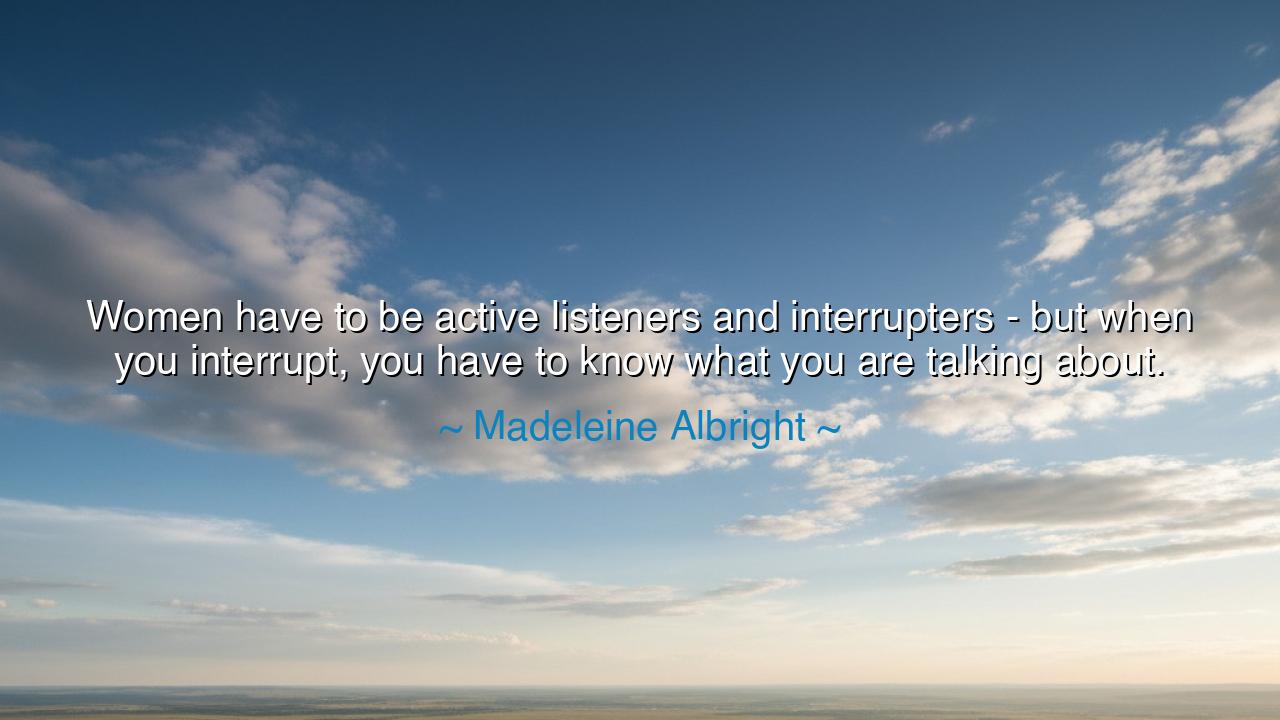
Women have to be active listeners and interrupters - but when
Women have to be active listeners and interrupters - but when you interrupt, you have to know what you are talking about.






When Madeleine Albright declared, “Women have to be active listeners and interrupters – but when you interrupt, you have to know what you are talking about,” she spoke from the battlefield of diplomacy, where words are weapons and silence can be defeat. Her counsel is a call to women to master both patience and courage: to listen with wisdom, and to speak with precision. For in councils where power gathers, to be silent too long is to vanish, but to speak without knowledge is to fall upon one’s own sword.
The ancients themselves praised this balance. In the assemblies of Athens, those who swayed the people were not the loudest, but those whose words bore the weight of understanding. Yet they also knew that the timid were forgotten. Thus Albright urges active listening, for through listening comes strength, the gathering of truth, the discerning of falsehood. But she also commands interruption, the boldness to pierce through the noise and stake one’s place in the chorus of power.
History offers us luminous examples. Consider Elizabeth I of England, standing before her troops at Tilbury, declaring she had the heart and stomach of a king. She was no passive listener—she seized the moment, interrupted centuries of doubt about a woman’s rule, and spoke with authority rooted in knowledge of her people and her peril. Her words transformed fear into courage, because she knew exactly what she was saying, and why it must be said.
Albright’s teaching warns also of the dangers of speaking without substance. To interrupt is to challenge the flow of power, to seize attention from those unwilling to yield it. Such an act must be sharpened by knowledge, or it becomes folly. A woman who rises without mastery of her subject may be dismissed, but one who interrupts with truth in her mouth becomes unassailable.
Thus, let this wisdom be passed down: learn to listen deeply, as the roots of a tree drink from the soil, but when the time comes, rise like the thundercloud and speak with lightning. For in a world that too often seeks to silence women, listening alone is not enough, and interruption without wisdom is in vain. But the union of the two—patience and power, silence and speech—becomes the very voice that changes nations and shapes destiny.






CLLe Thi Cam Ly
Madeleine Albright’s point is spot on. Women need to assert themselves in conversations, especially in spaces where they’re underrepresented. But there’s a lot of pressure to be knowledgeable and prepared when interrupting. I wonder, does this expectation prevent women from speaking up in the first place? Shouldn’t there be more room for women to express their thoughts without feeling like they need to 'prove' themselves every time they contribute?
NHnguyen huy
This quote by Madeleine Albright really made me think about the communication dynamics in professional settings. Women do often need to interrupt to be noticed or taken seriously, but the added pressure to always have the right answer can be exhausting. How do we change this? Is it possible to cultivate environments where everyone—regardless of gender—feels comfortable speaking their mind without worrying about being judged or dismissed?
QYquynh yen
I appreciate Madeleine Albright’s insight into how women must navigate communication in male-dominated environments. Being an interrupter is often seen as a negative trait, but when a woman does it, it seems like it’s to claim space or assert authority. Do women feel like they need to constantly prove their knowledge when speaking up? How can we create a more balanced environment where everyone feels equally empowered to speak without fear of judgment?
TTThinh Tran
Albright’s words highlight a double standard in how women are expected to communicate. Women are often expected to listen intently, but when they speak up, they have to be 'on point.' Does this create pressure on women to always be well-prepared, while men may not face the same scrutiny? How do we address the implicit bias in communication that makes women feel like they need to be more authoritative to be heard?
HTHappy Testing
Madeleine Albright's point about women needing to be both active listeners and interrupters resonates with me. It's true that women often have to work harder to be heard in conversations, especially in professional settings. But I wonder, does this mean that women are sometimes expected to prove themselves more than men just to have their voices acknowledged? How do we shift the culture so that women don't feel like they have to constantly interrupt to be taken seriously?